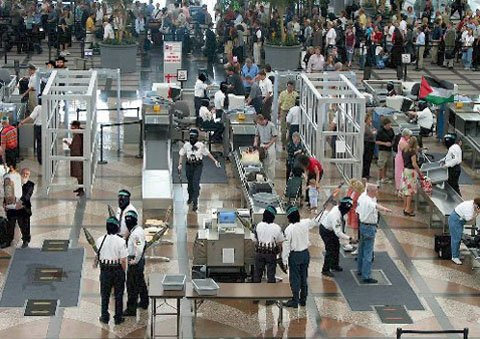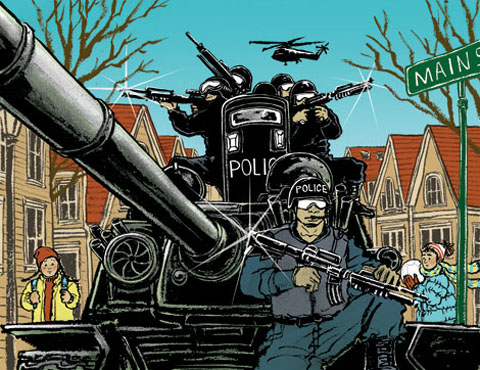by Glenn Harlan Reynolds on 28 November 2006 in Polular Mechanics
Soldiers and police are supposed to be different. Soldiers are aimed at enemies from outside the country. They are trained to kill those enemies, and their supporters. In fact, “killing people and breaking things” are their main reasons for existence.
Police look inward. They’re supposed to protect their fellow citizens from criminals, and to maintain order with a minimum of force.
It’s the difference between Audie Murphy and Andy Griffith. But nowadays, police are looking, and acting, more like soldiers than cops, with bad consequences. And those who suffer the consequences are usually innocent civilians. The trend toward militarizing police began in the ’60s and ’70s when standoffs with the Black Panthers, the Symbionese Liberation Army, and the University of Texas bell tower gunman Charles Whitman convinced many
police departments that they needed more than .38 specials to deal with unusual, high-intensity threats.
In 1965 Los Angeles inspector Daryl Gates, who later became police chief, signed off on the formation of a specially trained and equipped unit that he wanted to call the Special Weapons Attack Team. (The name was changed to the more palatable Special Weapons and Tactics). SWAT programs soon expanded beyond big cities with gang problems.
Abetting this trend was the federal government’s willingness to make surplus military equipment available to police and sheriffs’ departments. All sorts of hardware is available, from M-16s to body armor to armored personnel carriers and even helicopters. Lots of police departments grabbed the gear and started SWAT teams, even if they had no real need for them. The materiel was free, and it was fun. I don’t blame the police. Heck, if somebody
gave me a Bradley Fighting Vehicle to play with, I’d probably start a SWAT team, too—so long as I didn’t have to foot the maintenance bill.
Thus, the sheriff’s department in landlocked Boone County, Indiana, has an amphibious armored personnel carrier. (According to that county’s sheriff-elect, the vehicle has been used to deliver prescriptions to snow-bound elderly residents, and to provide protection during a suspected hostage situation.)
Jasper, Florida, with 2000 inhabitants and two murders in the past 12 years, obtained seven M-16s from the federal government, leading an area newspaper to run a story with the subhead,
“Three stoplights, seven M-16s.”
This approach, though, has led to problems both obvious and subtle. The obvious problem should be especially apparent to readers of this magazine: Once you’ve got a cool tool, you kind of want to use it. That’s true whether it’s a pneumatic drill, a laser level or an armored fighting vehicle. SWAT teams, designed to deal with rare events, wound up doing routine police work, like serving drug warrants.
The subtle effect is also real: Dress like a soldier and you think you’re at war.
And, in wartime, civil liberties—or possible innocence—of the people on “the other side” don’t come up much. But the police aren’t at war with the citizens they serve, or at least they’re not supposed to be.
The combination of these two factors has led to some tragic mistakes: “no knock” drug raids, involving “dynamic entry,” where the wrong house has been targeted or where the raid was based on informants’ tips that turned out to be just plain wrong.
On Sept. 23, 2006, a SWAT team descended on the home of a farmer and his schoolteacher wife in Bedford County, Va. “I was held at gunpoint, searched, taunted and led into the house,” A.J. Nuckols wrote to his local paper. “I was scared beyond description. I feared there had been a murder and I was a suspect.” When the couple’s three children came home, the police grilled them, too.
The family was held under guard for five hours as the SWAT team ransacked the place, seizing computers, a digital camera, DVDs and VHS tapes. Ten days later, the cops returned the belongings. It turned out that a special anti-child-porn police unit had made a mistake while tracing an computer address and sent the SWAT team to the wrong home.
Sometimes, homeowners are killed in these actions; other times, it’s the officers. When a narcotics task force raided a duplex apartment in Jefferson Davis County, Miss., in 2001, they arrested one tenant, then burst into the adjacent apartment of Cory Maye. Thinking a burglar had broken into the bedroom he shared with his toddler daughter. Maye shot the officer fatally. Maye was convicted of murder and sentenced to death. However, his sentencing was
overturned, and a motion for a new trial is still pending.
And, in a case that is now drawing national attention, 92-year-old Kathryn Johnston, who lived in a high-crime neighborhood of Atlanta, recently opened fire on police when they broke down her door while executing a drug warrant. They returned fire, killing her. It’s hard to believe any of this would have happened had the police taken a less aggressive approach in the first place.
It used to be that police came to the door, announced themselves and, once a homeowner responded, entered the premises. Most policemen still work this way. But an alarming number now break down doors first and ask questions later. Don’t get me wrong: Police often do dangerous work and they need equipment that’s going to protect them.
And dynamic entry is valid when dealing with desperate criminals, but these tactics put ordinary citizens—and the police—at risk. And when they do, it’s often hard to get redress. Lawsuits against police and supervisors face strict legal limits in the form of “qualified immunity,” and prosecutors, who work with the police on a regular basis, are unlikely to bring criminal charges
against officers who negligently kill people.
But homeowners confronted with tactics like flash-bang grenades and shouting that are intended to disorient targets, tend to be held to a much higher standard. The result, as in the Cory Maye case, is that people who do the laudable thing and defend their homes against unknown, armed intruders sometimes wind up being prosecuted for murder.
I discussed the issue with political commentator Radley Balko, who wrote a troubling report titled “Overkill: The Rise of Paramilitary Police Raids in America.” Balko said that the problem is more common than people realize. He suggests that accountability and transparency are what we need. I agree. Police raids should be videotaped, in an archival format that discourages tampering. And I think we need legal reform, too. Police who raid the wrong
house, or who fail to give homeowners adequate warning except in truly life-or-death situations, shouldn’t benefit from official immunity.
Our homes are supposed to be our castles. The police shouldn’t treat them like enemy camps.
|

